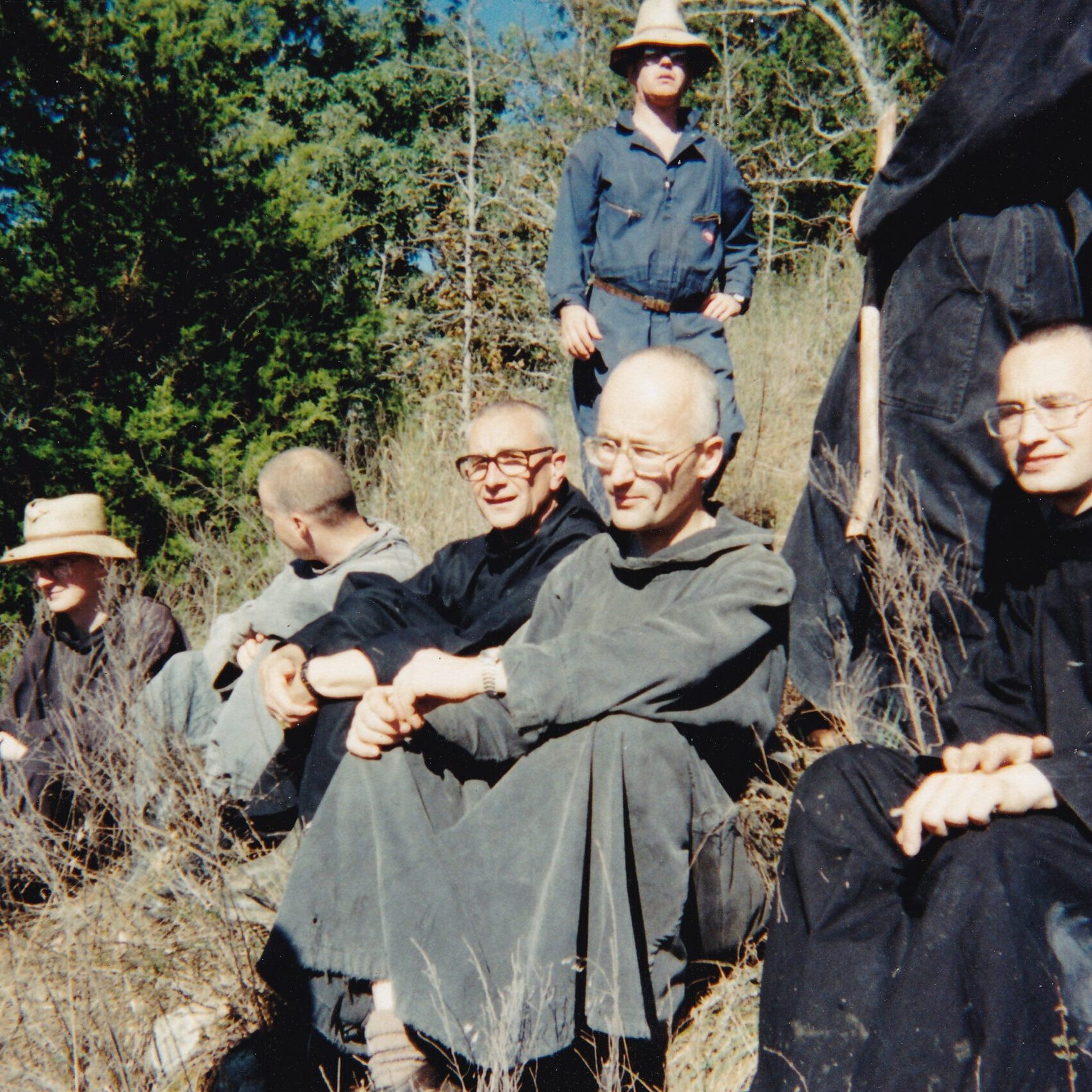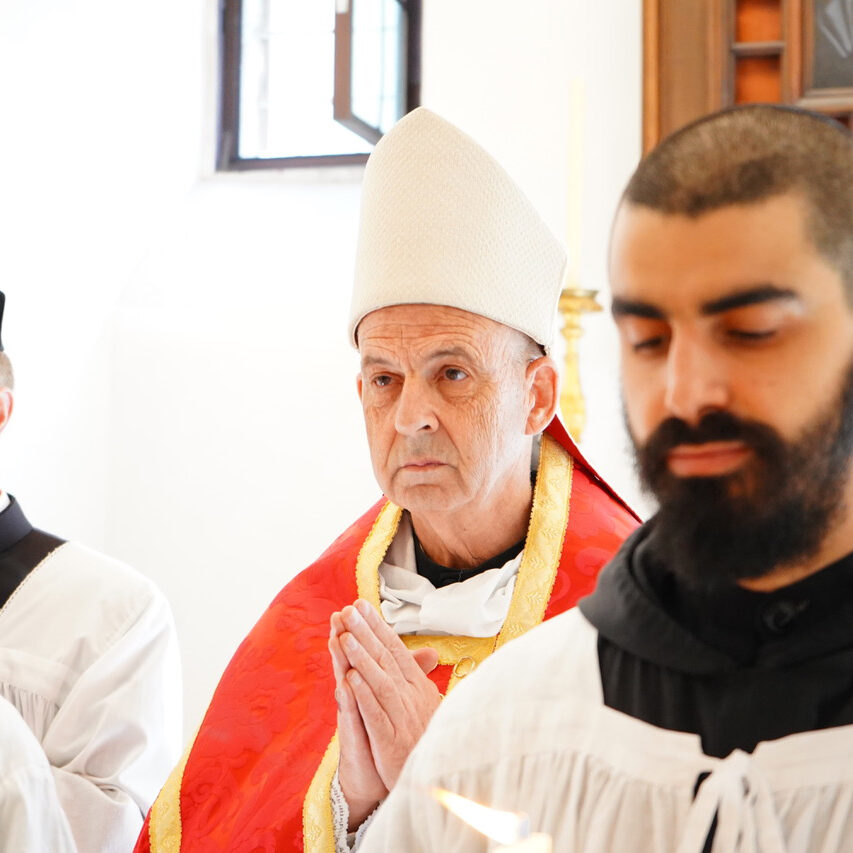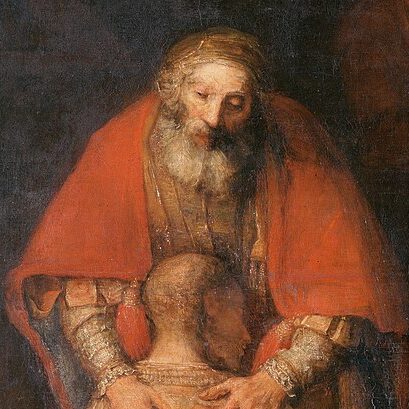“Fuit vir vitae venerabilis, gratia Benedictus et nomine … There once was a man of saintly life; Blessed Benedict was his name and he was blessed by God’s grace.” (St. Gregory the Great, Dialogues)
Dear Friends of Clear Creek Monastery,
The Mystery and Power of a Name
Great is the mystery in a name. For the Hebrews, the name of God was so holy that mortal lips were forbidden to pronounce it. The name given to a human being, likewise, touches something deeper than the circumstances of birth: it has to do with this little world, this microcosm we call the person. Each person, whether Divine, angelic, or human, is unique.
Some names contain a particular power. This is especially true of the name “Benedict,” of St. Benedict, whose feast we will celebrate on July 11 (on our monastic liturgical calendar, we celebrate two feasts of St. Benedict: one on March 21, day of his death or “transitus,” the other on July 11, date of the transfer of his relics from Italy to France). Pope St. Gregory the Great recounts in Book Two of his Dialogues how this name became particularly distasteful to Satan, because of the way the whole countryside around St. Benedict’s monastery was converting to the Catholic faith. “Such losses,” writes St. Gregory, “the ancient enemy could not bear in silence … [He] did not appear to the saint in a dream or under a disguise, but met him face to face and objected fiercely to the defeats he had to endure. His shouts were so loud that the brethren heard him too, although they were unable to see him. According to the saint’s own description, the Devil had an appearance utterly revolting to human eyes… Everyone could hear what he was saying. First, he called Benedict by his name. Then, finding that the saint would not answer, he broke out in abusive language. “Benedict, Benedict, blessed Benedict!” he would begin, and then add “You cursed Benedict! Cursed [maledict] not blessed! What do you want with me? Why are you tormenting me like this?”
Why does this name of St. Benedict have such power? For one thing, it expresses the vocation of St. Benedict as Patriarch of the monks of the Western world: being called to such an important task, he received a special name with the power to bring blessings to a Christian world in the making. In a more general way, the blessings of his name flow from the hundred-fold promised to those who leave all to follow Christ, as we read in the Gospel (St. Matthew 19: 27-29): “Amen I say to you … every one that hath left house, or brethren, or sister, or father, or mother, or wife, or children, or lands, for my sake, shall receive an hundred fold, and shall have life everlasting.”
Who could doubt that our age stands in particular need of the power of this name? The Sovereign Pontiff said as much in a discourse on July 10 of last year: “Tomorrow we will celebrate the feast of St. Benedict of Norcia, patron of Europe, a saint who is particularly dear to me, as can be intuited from my choice of his name … Amid the ashes of the Roman Empire, Benedict, seeking first of all the kingdom of God, sowed, even without realizing it, the seed of a new civilization …” Pope Benedict XVI, now called upon to guide the Church, seems to recognize a similar need in our own time.
Join Us in a Special Novena of Prayers
I am inviting you to join the monastic community this year, in a novena to Saint Benedict, leading up to his Feast of July 11 (July 2-10). Accompanying this letter, you will find a holy card with a prayer to this Patriarch of monks, asking for his intercession before God. Other prayers of your choice may be added to this little one, as you see fit. Many are the intentions we must present before the throne of Divine Majesty and Mercy. In the face of unveiled attacks upon the faith, notably the recently released movie The Da Vinci Code -it is high time to take up the spiritual arms at our disposal: adoration of the Blessed Sacrament, devotion to Our Lady, fidelity to the Holy See… and invocation of the name of St. Benedict. One novena may seem like an insignificant moment in the greater spiritual battle; however, it takes only but one candle to light an immensity of others.
The Restoration of Fatherhood
A holy Abbot once wrote that “no earthly fatherhood has ever so closely resembled the fatherhood of God as did St. Benedict’s. The Church venerates him as the patriarch of the monks of the West; and God has so disposed the course of history that every religious Order is in some way indebted to him and has learnt from his fatherly wisdom.” (Abbot Paul Delatte, Commentary on the Rule, pg. 1) Among the various needs of our time, a fundamental restoration of the understanding of what it means to be a father – at every level of human experience – certainly rates very high. Would that St. Benedict, Our Blessed Father as we monks lovingly refer to him, might obtain for us from God a renewal of that most fundamental reality. The Bishop of Antioch, St. Ignatius, shortly before his martyrdom penned the following line: “I hear within myself something like a sound of running water which says: ‘Come to the Father.”‘ What a marvelous description of the spiritual life!
A Particular Intention for the Monks of Clear Creek
As I type this letter, plans to recommence construction on our monastery are taking definite shape. With the grace of God, we hope to sign a contract for the next stage of construction on or about August 15 of this year. There is real hope that construction will commence not too long after that date. Although this long desired moment seems to be approaching with sure steps, there remains much to be done and worked out, given the size of this construction project and the relatively modest resources we have at our disposal.
St. Benedict was quite a builder himself. St. Gregory says that, in the region of Subiaco alone, he founded twelve monasteries. It is our hope that the monastery we are building will be nothing other than a kind of expression in stone and brick of the fatherly sanctity of St. Benedict. May God obtain for us the grace of resembling him more and more. The monastic liturgy paints the following picture: “There was a man of the Lord, Benedict, of peaceful countenance and endowed with angelic manners; such was the brightness which grew around him that, while yet on earth, he lived already in Heaven.”
Thank you for your continued prayers and support. May God bless you and Our Lady smile upon you.
Bro. Philip Anderson, Prior of Our Lady of Clear Creek
“Fuit vir vitae venerabilis, gratia Benedictus et nomine … There once was a man of saintly life; Blessed Benedict was his name and he was blessed by God’s grace.” (St. Gregory the Great, Dialogues)
Dear Friends of Clear Creek Monastery,
The Mystery and Power of a Name
Great is the mystery in a name. For the Hebrews, the name of God was so holy that mortal lips were forbidden to pronounce it. The name given to a human being, likewise, touches something deeper than the circumstances of birth: it has to do with this little world, this microcosm we call the person. Each person, whether Divine, angelic, or human, is unique.
Some names contain a particular power. This is especially true of the name “Benedict,” of St. Benedict, whose feast we will celebrate on July 11 (on our monastic liturgical calendar, we celebrate two feasts of St. Benedict: one on March 21, day of his death or “transitus,” the other on July 11, date of the transfer of his relics from Italy to France). Pope St. Gregory the Great recounts in Book Two of his Dialogues how this name became particularly distasteful to Satan, because of the way the whole countryside around St. Benedict’s monastery was converting to the Catholic faith. “Such losses,” writes St. Gregory, “the ancient enemy could not bear in silence … [He] did not appear to the saint in a dream or under a disguise, but met him face to face and objected fiercely to the defeats he had to endure. His shouts were so loud that the brethren heard him too, although they were unable to see him. According to the saint’s own description, the Devil had an appearance utterly revolting to human eyes… Everyone could hear what he was saying. First, he called Benedict by his name. Then, finding that the saint would not answer, he broke out in abusive language. “Benedict, Benedict, blessed Benedict!” he would begin, and then add “You cursed Benedict! Cursed [maledict] not blessed! What do you want with me? Why are you tormenting me like this?”
Why does this name of St. Benedict have such power? For one thing, it expresses the vocation of St. Benedict as Patriarch of the monks of the Western world: being called to such an important task, he received a special name with the power to bring blessings to a Christian world in the making. In a more general way, the blessings of his name flow from the hundred-fold promised to those who leave all to follow Christ, as we read in the Gospel (St. Matthew 19: 27-29): “Amen I say to you … every one that hath left house, or brethren, or sister, or father, or mother, or wife, or children, or lands, for my sake, shall receive an hundred fold, and shall have life everlasting.”
Who could doubt that our age stands in particular need of the power of this name? The Sovereign Pontiff said as much in a discourse on July 10 of last year: “Tomorrow we will celebrate the feast of St. Benedict of Norcia, patron of Europe, a saint who is particularly dear to me, as can be intuited from my choice of his name … Amid the ashes of the Roman Empire, Benedict, seeking first of all the kingdom of God, sowed, even without realizing it, the seed of a new civilization …” Pope Benedict XVI, now called upon to guide the Church, seems to recognize a similar need in our own time.
Join Us in a Special Novena of Prayers
I am inviting you to join the monastic community this year, in a novena to Saint Benedict, leading up to his Feast of July 11 (July 2-10). Accompanying this letter, you will find a holy card with a prayer to this Patriarch of monks, asking for his intercession before God. Other prayers of your choice may be added to this little one, as you see fit. Many are the intentions we must present before the throne of Divine Majesty and Mercy. In the face of unveiled attacks upon the faith, notably the recently released movie The Da Vinci Code -it is high time to take up the spiritual arms at our disposal: adoration of the Blessed Sacrament, devotion to Our Lady, fidelity to the Holy See… and invocation of the name of St. Benedict. One novena may seem like an insignificant moment in the greater spiritual battle; however, it takes only but one candle to light an immensity of others.
The Restoration of Fatherhood
A holy Abbot once wrote that “no earthly fatherhood has ever so closely resembled the fatherhood of God as did St. Benedict’s. The Church venerates him as the patriarch of the monks of the West; and God has so disposed the course of history that every religious Order is in some way indebted to him and has learnt from his fatherly wisdom.” (Abbot Paul Delatte, Commentary on the Rule, pg. 1) Among the various needs of our time, a fundamental restoration of the understanding of what it means to be a father – at every level of human experience – certainly rates very high. Would that St. Benedict, Our Blessed Father as we monks lovingly refer to him, might obtain for us from God a renewal of that most fundamental reality. The Bishop of Antioch, St. Ignatius, shortly before his martyrdom penned the following line: “I hear within myself something like a sound of running water which says: ‘Come to the Father.”‘ What a marvelous description of the spiritual life!
A Particular Intention for the Monks of Clear Creek
As I type this letter, plans to recommence construction on our monastery are taking definite shape. With the grace of God, we hope to sign a contract for the next stage of construction on or about August 15 of this year. There is real hope that construction will commence not too long after that date. Although this long desired moment seems to be approaching with sure steps, there remains much to be done and worked out, given the size of this construction project and the relatively modest resources we have at our disposal.
St. Benedict was quite a builder himself. St. Gregory says that, in the region of Subiaco alone, he founded twelve monasteries. It is our hope that the monastery we are building will be nothing other than a kind of expression in stone and brick of the fatherly sanctity of St. Benedict. May God obtain for us the grace of resembling him more and more. The monastic liturgy paints the following picture: “There was a man of the Lord, Benedict, of peaceful countenance and endowed with angelic manners; such was the brightness which grew around him that, while yet on earth, he lived already in Heaven.”
Thank you for your continued prayers and support. May God bless you and Our Lady smile upon you.
Bro. Philip Anderson, Prior of Our Lady of Clear Creek






